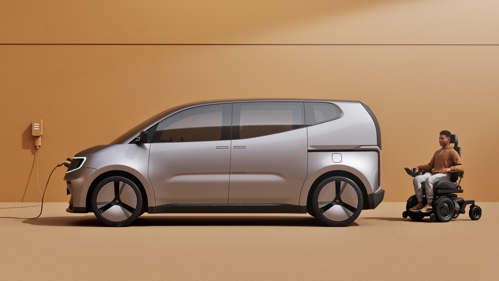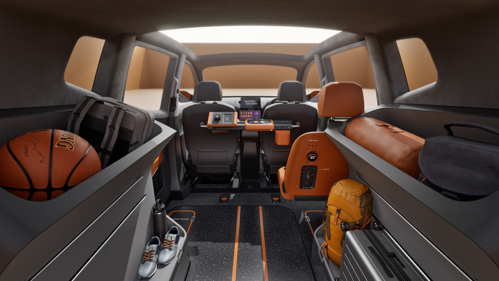Motability Operations is best known as the commercial organisation that delivers the life-changing Motability Scheme to disabled people across the UK. Now, however, it has revealed eVITA, its next-generation electric wheelchair accessible vehicle (eWAV) concept. Designed and engineered by CALLUM, eVITA addresses the needs of passenger WAV users in the transition to small/medium electric vehicles.
The EV concept has been developed using inclusive design principles with input from Motability Scheme customers throughout. Utilising eVITA to demonstrate what is possible, Motability Operations wants to collaborate with the automotive industry to ensure inclusive design principles are considered throughout development, so that wheelchair users are not left behind.
Motability Operations is supporting its 750,000 customers in the transition to EVs by highlighting challenges and finding solutions. It currently has over 34,000 WAVs on the road, with around 4,000 applications each year for small and medium WAVs. In many EVs, the floor-mounted battery reduces internal height and space within the cabin and also limits the available payload. Without a solution, this would lead to customers in a wheelchair having to opt for larger vehicles than they need when switching to electric.
“The transition to electric simply won’t work unless it’s accessible for all,” says Andrew Miller, chief executive of Motability Operations. “We have the largest fleet in the UK and three quarters of a million disabled customers who rely on their vehicles for their independence. Our customers aren’t the typical early EV adopters, they’re more representative of the wider population, and we know from first-hand insight what the challenges of having an EV will be for everyone. Without solutions and an equitable switch to electric, thousands of people could be left behind.
“This is most pressing for our customers who use wheelchair accessible vehicles as they don’t have an obvious or affordable solution to transition to a smaller EV. We were determined to find a way forward, and I’m absolutely delighted that we have developed the eVITA concept with CALLUM that genuinely has accessibility and inclusivity at the heart of its design, demonstrating what is possible. We’re sharing our knowledge and understanding with the industry – manufacturers, designers and engineers – to support an EV transition that works for everyone.”
Customer clinics
Through research clinics, Motability Scheme customers provided valuable insight into the common pain points and priorities for passenger WAV users when on the road. Customers were insistent that the solution should be flexible and address their access needs without compromising design form.
The CALLUM team, overseen by Ian Callum CBE and led by head of design Aleck Jones, set about creating such a vehicle, eVITA.
The exterior has a bold and striking silhouette, with a sleek roofline that accommodates access requirements and provides appropriate headroom for wheelchair users entering via the rear split tailgate. With a wheelbase of 2,980mm, eVITA measures 4,520mm in length, 1,908mm in width and 1,800mm in height, to also address wishes for a more compact footprint than is currently available.
“Today, electric vehicles are not offering the functionality and flexibility required by WAV users,” says Ian Callum, design director at CALLUM. “OEMs, their designers and engineers must plan ahead and embrace inclusive design principles to ensure that WAV users and disabled people are not forgotten in the transition to EVs. With eVITA, form and functionality have been developed in parallel, resulting in a well-considered, user-friendly EV that is both practical and stylish.”
Battery repackaging
Critical to the design of eVITA is the positioning of the battery. Led by engineering director Adam Donfrancesco, the CALLUM engineering team has repackaged the EV battery, rearranging the internal components to reduce its overall height. With the reengineered battery pack positioned under the floor behind the first row of seats, the design ensures that the floor between the vehicle tailgate and front row is completely flat. This allows a wheelchair to smoothly travel from the ramped entrance through the interior and be positioned closer to other occupants. Where possible, lightweight materials have been used to offset the payload requirements for onboard equipment.
This packaging design has allowed for a ride height of 160mm, which is akin to that of a hatchback. This contributes to easier access and increased headroom. It also means that the wheelchair user has an improved, lower seating position in the cabin, which was important for many Motability Scheme customers. Having wheelchair users at a similar height to other vehicle occupants helps them to feel more connected to other passengers and also improves visibility. With a higher seating position, visibility can be restricted by the roofline. Sitting lower, combined with a glasshouse of over 35,000cm2 that also features a cutaway panoramic roof, ensures optimum visibility for all vehicle occupants, while the dramatic side window graphic adds style and interest.
eVITA features two charging ports – one on the nearside rear and a lower, front-mounted option for ease of access for all users. The vehicle’s 50kWh battery provides an anticipated range of around 200 miles.
The battery positioning has also contributed to a lower centre of gravity for improved ride and cornering ability. eVITA features a highly damped rear suspension for predictable handling, balancing a comfortable and supple ride with control to minimise roll whilst navigating roundabouts, speed bumps and potholes.
Innovative lighting
The cabin has two front and two rear doors, with the rear sliding doors featuring accessible release buttons. eVITA features a split tailgate – the upper section acting as an extension to the roof to keep users dry when entering and exiting in wet weather – with electronic door opening system. A wide, low angle ramp automatically extends from inside, with a winch aiding wheelchair users’ entry into the vehicle cabin. The tailgate is a critical functional feature of the eWAV and an area where Scheme customers really emphasised the need for easy operation.
Additionally, customers stressed the common frustration of other motorists parking too close to the rear, making it difficult – and often impossible – to lower the access ramp when returning to their vehicle. To alert other motorists while parked, eVITA uses energy-efficient LED puddle lights to visually project onto the ground the essential space required for the extended ramp at the rear of the vehicle.
Inclusive, versatile interior
Inside, the functionality and versatility of the eWAV cabin is of the utmost priority for users. A flip seat in the rear provides flexible seating options that can be personalised to the occupants’ preferences.

A key requirement was access to all the infotainment, heating and air conditioning controls and features, as often all these are located in and only benefit those in the front of a vehicle. The solution is a modular ‘utility bar’ in the rear of eVITA that provides easy access to all these functions, ensuring the occupant has full control and independence. Fully customisable, the utility bar also includes charging ports for personal devices, and can feature hooks for hanging coats or bags, as well as easy-to-reach storage, such as cup holders.
Next generation perspective
Within the CALLUM team that has been working on eVITA are students Zoe Graham and Yikuan Zhang, who were hand-selected in early 2023 following ‘design hacks’ at The Glasgow School of Art and Coventry University. Tasked with creating an eWAV concept, both Graham and Zhang’s innovative ideas stood out and they won themselves paid placements at Warwickshire-based CALLUM to support on this project. Their placements align with CALLUM’s ‘Next Generation’ initiative that supports and nurtures the next wave of talent joining the automotive industry, creating a welcoming environment that encourages the sharing of ideas. Graham and Zhang’s fresh and innovative perspectives have been valuable to the project, with Graham developing the ramp light projection idea to ensure other motorists leave enough space around eWAVs for access.
CALLUM managing director, David Fairbairn, says: “The CALLUM team is incredibly proud to reveal eVITA and to work with Motability Operations on such an important project that has the potential to positively impact so many lives, supporting Motability Scheme customers with freedom and enjoyment of travel as society transitions to electric. Through this project we’ve leveraged our innovative design skills and engineering ingenuity within the CALLUM business to challenge the industry to be more inclusive and equitable for a more positive future.”
Motability Operations CEO, Andrew Miller, adds: “Collaboration is key to making the EV transition a success for wheelchair users; we need our partners, manufacturers and policy makers to believe in better and to work alongside us to take action. eVITA shows what can be done. We are particularly grateful to Stellantis for its enthusiasm and technical support to develop our concept.”











